Managerial Accounting: Journal Article Critique, Relevance and Lessons
VerifiedAdded on 2022/10/10
|19
|4528
|210
Report
AI Summary
This report provides a comprehensive critique of journal articles focused on managerial accounting. It identifies specific examples of management accounting methods like Activity-Based Costing (ABC), Total Quality Management (TQM), and Just-in-Time (JIT) and discusses their relevance to contemporary organizations, drawing evidence from a case study. The report compares and contrasts findings from two articles, examining similarities and differences in their research, and highlights lessons learned that are useful for management accountants, particularly in Australian companies. The analysis concludes with an assessment of the relevance of Management Accounting Systems (MAS) in today's competitive and uncertain business environment, emphasizing the importance of selecting appropriate techniques based on organizational structure and manufacturing processes, and the reliance on external information for strategic decision-making.
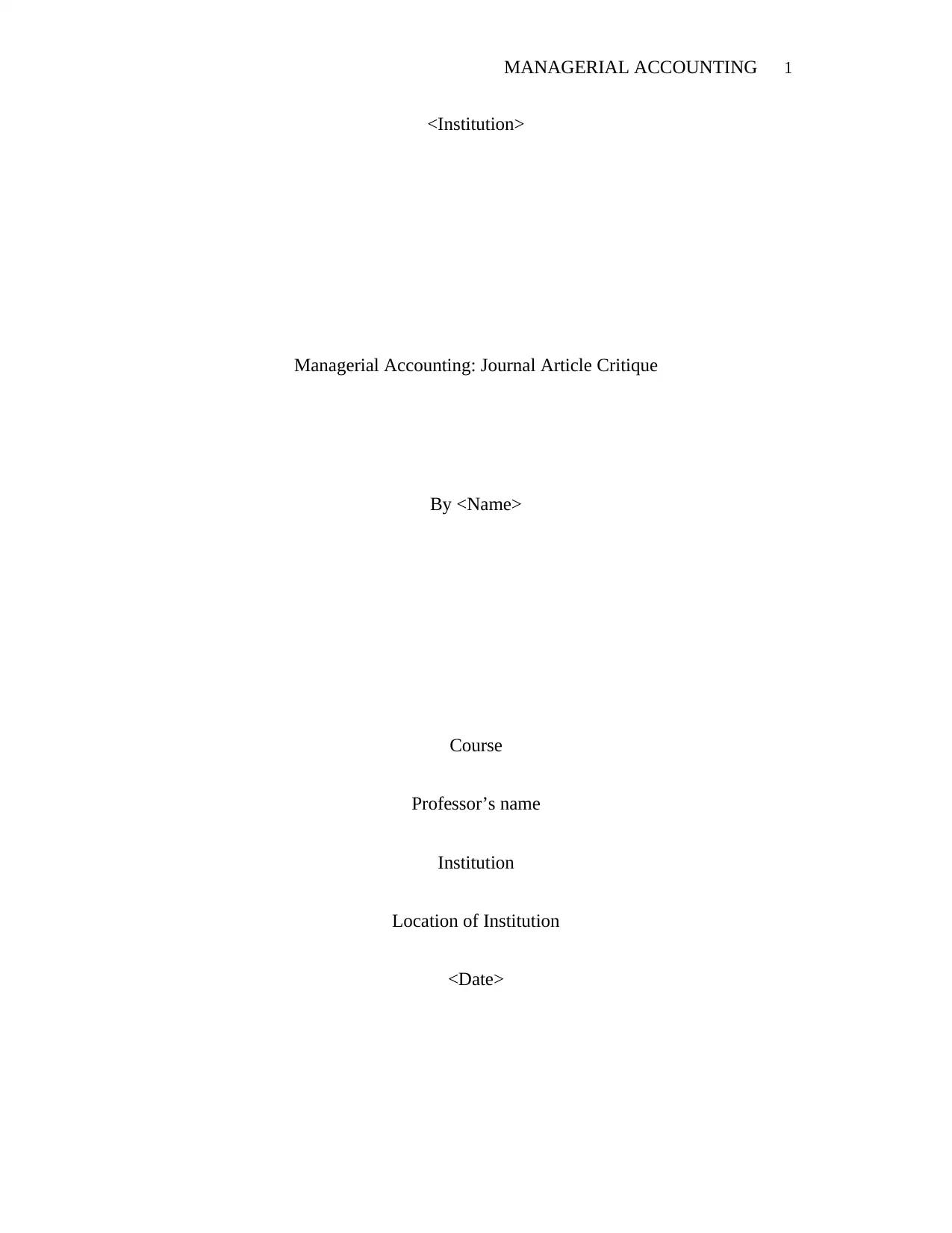
MANAGERIAL ACCOUNTING 1
<Institution>
Managerial Accounting: Journal Article Critique
By <Name>
Course
Professor’s name
Institution
Location of Institution
<Date>
<Institution>
Managerial Accounting: Journal Article Critique
By <Name>
Course
Professor’s name
Institution
Location of Institution
<Date>
Paraphrase This Document
Need a fresh take? Get an instant paraphrase of this document with our AI Paraphraser
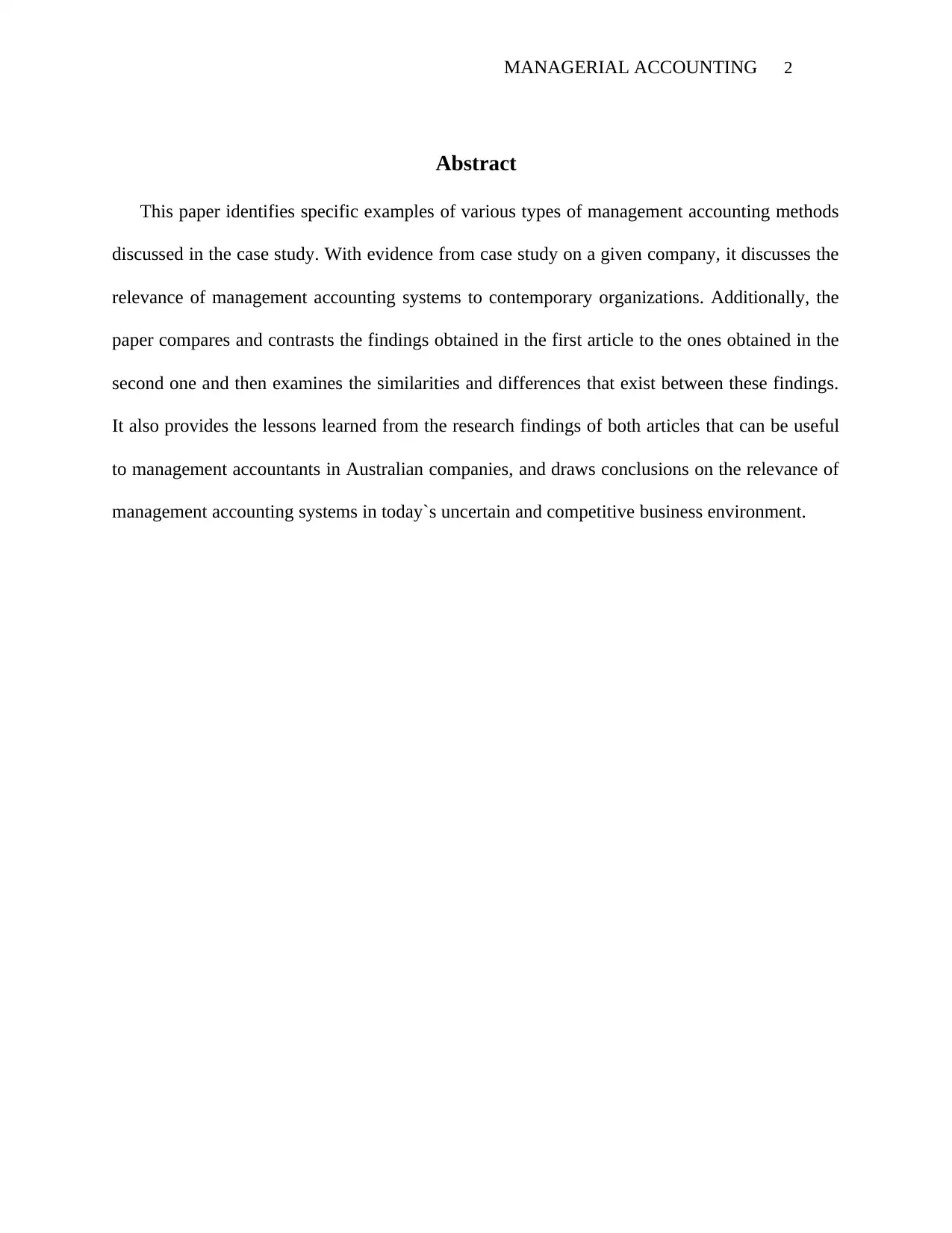
MANAGERIAL ACCOUNTING 2
Abstract
This paper identifies specific examples of various types of management accounting methods
discussed in the case study. With evidence from case study on a given company, it discusses the
relevance of management accounting systems to contemporary organizations. Additionally, the
paper compares and contrasts the findings obtained in the first article to the ones obtained in the
second one and then examines the similarities and differences that exist between these findings.
It also provides the lessons learned from the research findings of both articles that can be useful
to management accountants in Australian companies, and draws conclusions on the relevance of
management accounting systems in today`s uncertain and competitive business environment.
Abstract
This paper identifies specific examples of various types of management accounting methods
discussed in the case study. With evidence from case study on a given company, it discusses the
relevance of management accounting systems to contemporary organizations. Additionally, the
paper compares and contrasts the findings obtained in the first article to the ones obtained in the
second one and then examines the similarities and differences that exist between these findings.
It also provides the lessons learned from the research findings of both articles that can be useful
to management accountants in Australian companies, and draws conclusions on the relevance of
management accounting systems in today`s uncertain and competitive business environment.
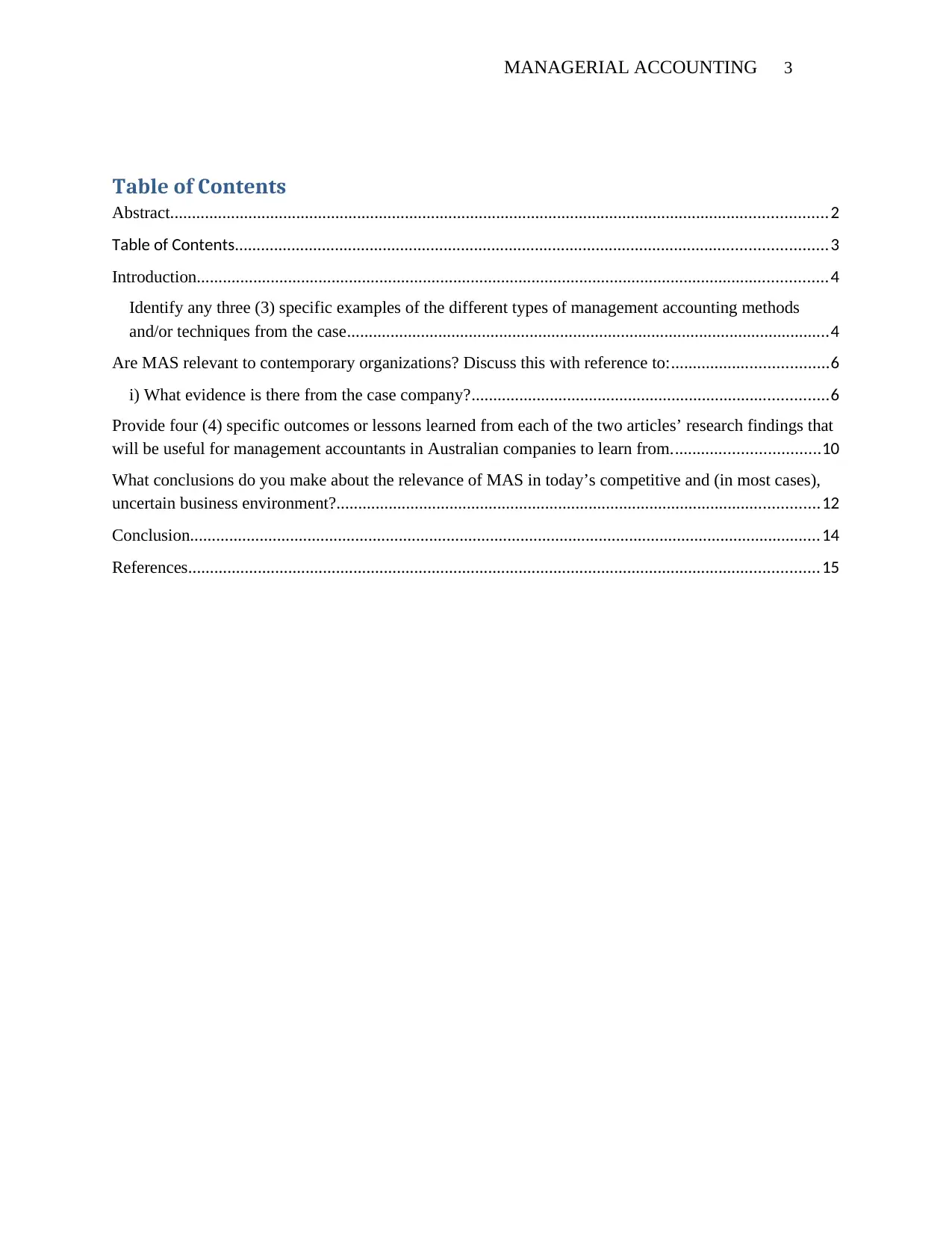
MANAGERIAL ACCOUNTING 3
Table of Contents
Abstract.......................................................................................................................................................2
Table of Contents........................................................................................................................................3
Introduction.................................................................................................................................................4
Identify any three (3) specific examples of the different types of management accounting methods
and/or techniques from the case...............................................................................................................4
Are MAS relevant to contemporary organizations? Discuss this with reference to:....................................6
i) What evidence is there from the case company?..................................................................................6
Provide four (4) specific outcomes or lessons learned from each of the two articles’ research findings that
will be useful for management accountants in Australian companies to learn from..................................10
What conclusions do you make about the relevance of MAS in today’s competitive and (in most cases),
uncertain business environment?...............................................................................................................12
Conclusion.................................................................................................................................................14
References.................................................................................................................................................15
Table of Contents
Abstract.......................................................................................................................................................2
Table of Contents........................................................................................................................................3
Introduction.................................................................................................................................................4
Identify any three (3) specific examples of the different types of management accounting methods
and/or techniques from the case...............................................................................................................4
Are MAS relevant to contemporary organizations? Discuss this with reference to:....................................6
i) What evidence is there from the case company?..................................................................................6
Provide four (4) specific outcomes or lessons learned from each of the two articles’ research findings that
will be useful for management accountants in Australian companies to learn from..................................10
What conclusions do you make about the relevance of MAS in today’s competitive and (in most cases),
uncertain business environment?...............................................................................................................12
Conclusion.................................................................................................................................................14
References.................................................................................................................................................15
⊘ This is a preview!⊘
Do you want full access?
Subscribe today to unlock all pages.

Trusted by 1+ million students worldwide
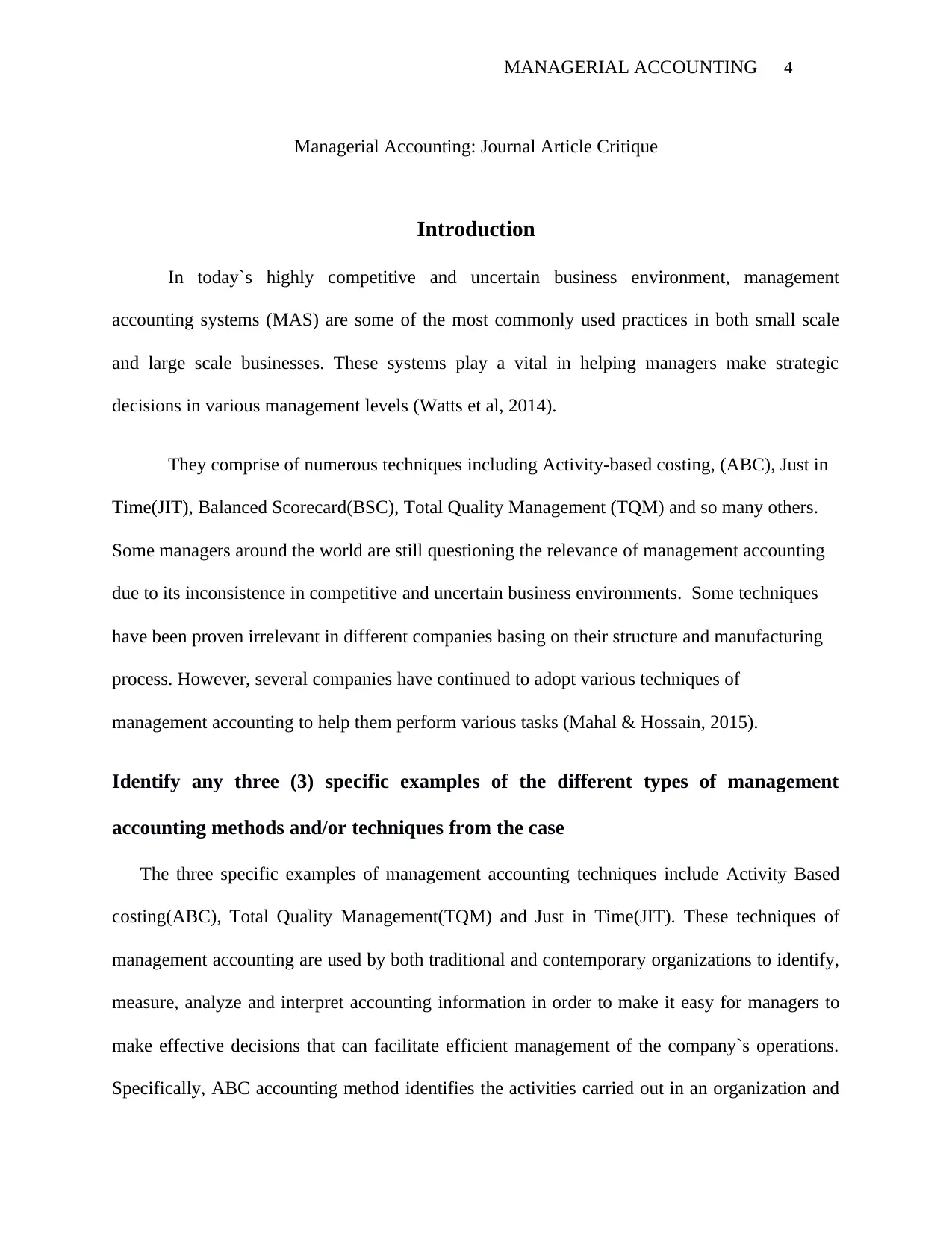
MANAGERIAL ACCOUNTING 4
Managerial Accounting: Journal Article Critique
Introduction
In today`s highly competitive and uncertain business environment, management
accounting systems (MAS) are some of the most commonly used practices in both small scale
and large scale businesses. These systems play a vital in helping managers make strategic
decisions in various management levels (Watts et al, 2014).
They comprise of numerous techniques including Activity-based costing, (ABC), Just in
Time(JIT), Balanced Scorecard(BSC), Total Quality Management (TQM) and so many others.
Some managers around the world are still questioning the relevance of management accounting
due to its inconsistence in competitive and uncertain business environments. Some techniques
have been proven irrelevant in different companies basing on their structure and manufacturing
process. However, several companies have continued to adopt various techniques of
management accounting to help them perform various tasks (Mahal & Hossain, 2015).
Identify any three (3) specific examples of the different types of management
accounting methods and/or techniques from the case
The three specific examples of management accounting techniques include Activity Based
costing(ABC), Total Quality Management(TQM) and Just in Time(JIT). These techniques of
management accounting are used by both traditional and contemporary organizations to identify,
measure, analyze and interpret accounting information in order to make it easy for managers to
make effective decisions that can facilitate efficient management of the company`s operations.
Specifically, ABC accounting method identifies the activities carried out in an organization and
Managerial Accounting: Journal Article Critique
Introduction
In today`s highly competitive and uncertain business environment, management
accounting systems (MAS) are some of the most commonly used practices in both small scale
and large scale businesses. These systems play a vital in helping managers make strategic
decisions in various management levels (Watts et al, 2014).
They comprise of numerous techniques including Activity-based costing, (ABC), Just in
Time(JIT), Balanced Scorecard(BSC), Total Quality Management (TQM) and so many others.
Some managers around the world are still questioning the relevance of management accounting
due to its inconsistence in competitive and uncertain business environments. Some techniques
have been proven irrelevant in different companies basing on their structure and manufacturing
process. However, several companies have continued to adopt various techniques of
management accounting to help them perform various tasks (Mahal & Hossain, 2015).
Identify any three (3) specific examples of the different types of management
accounting methods and/or techniques from the case
The three specific examples of management accounting techniques include Activity Based
costing(ABC), Total Quality Management(TQM) and Just in Time(JIT). These techniques of
management accounting are used by both traditional and contemporary organizations to identify,
measure, analyze and interpret accounting information in order to make it easy for managers to
make effective decisions that can facilitate efficient management of the company`s operations.
Specifically, ABC accounting method identifies the activities carried out in an organization and
Paraphrase This Document
Need a fresh take? Get an instant paraphrase of this document with our AI Paraphraser
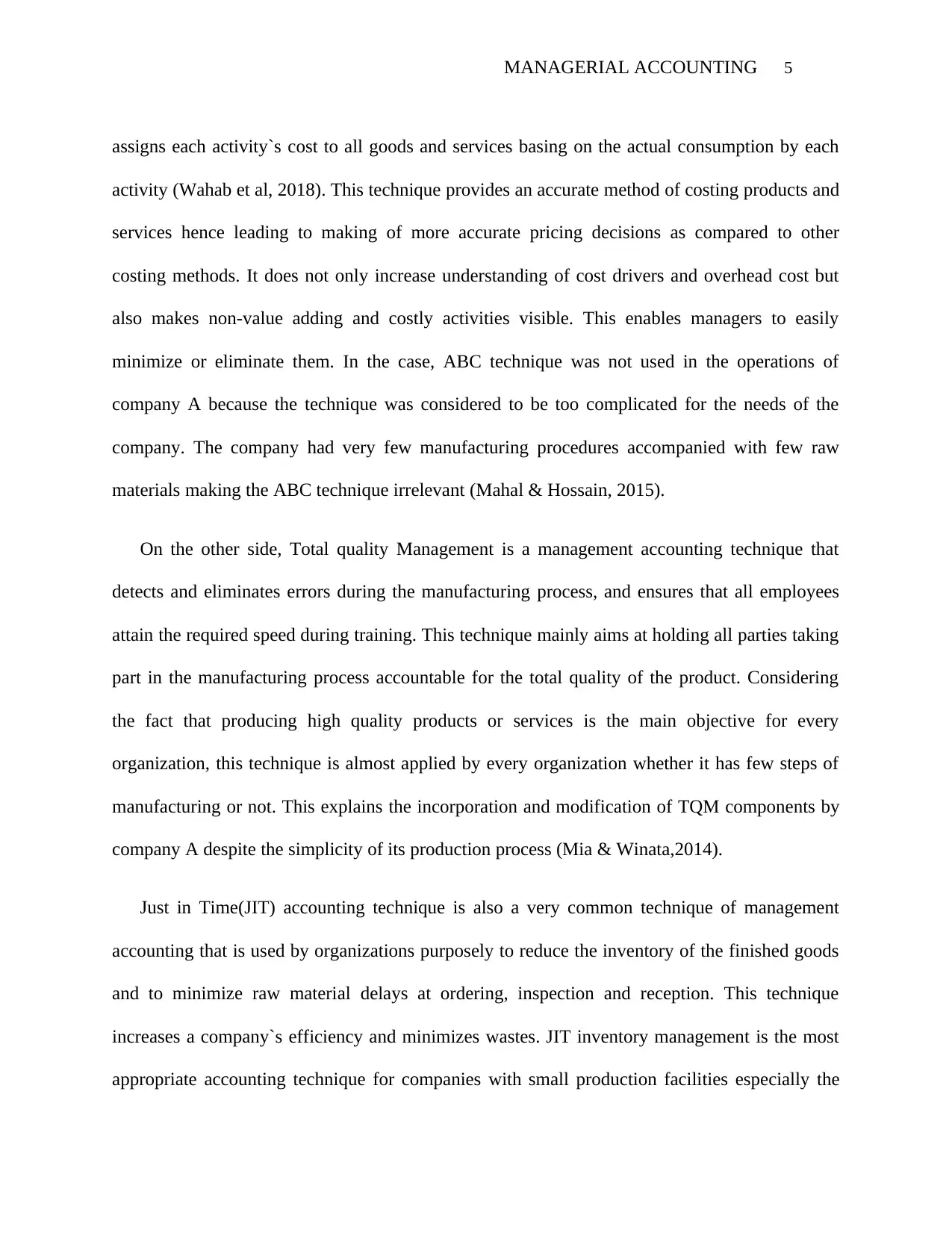
MANAGERIAL ACCOUNTING 5
assigns each activity`s cost to all goods and services basing on the actual consumption by each
activity (Wahab et al, 2018). This technique provides an accurate method of costing products and
services hence leading to making of more accurate pricing decisions as compared to other
costing methods. It does not only increase understanding of cost drivers and overhead cost but
also makes non-value adding and costly activities visible. This enables managers to easily
minimize or eliminate them. In the case, ABC technique was not used in the operations of
company A because the technique was considered to be too complicated for the needs of the
company. The company had very few manufacturing procedures accompanied with few raw
materials making the ABC technique irrelevant (Mahal & Hossain, 2015).
On the other side, Total quality Management is a management accounting technique that
detects and eliminates errors during the manufacturing process, and ensures that all employees
attain the required speed during training. This technique mainly aims at holding all parties taking
part in the manufacturing process accountable for the total quality of the product. Considering
the fact that producing high quality products or services is the main objective for every
organization, this technique is almost applied by every organization whether it has few steps of
manufacturing or not. This explains the incorporation and modification of TQM components by
company A despite the simplicity of its production process (Mia & Winata,2014).
Just in Time(JIT) accounting technique is also a very common technique of management
accounting that is used by organizations purposely to reduce the inventory of the finished goods
and to minimize raw material delays at ordering, inspection and reception. This technique
increases a company`s efficiency and minimizes wastes. JIT inventory management is the most
appropriate accounting technique for companies with small production facilities especially the
assigns each activity`s cost to all goods and services basing on the actual consumption by each
activity (Wahab et al, 2018). This technique provides an accurate method of costing products and
services hence leading to making of more accurate pricing decisions as compared to other
costing methods. It does not only increase understanding of cost drivers and overhead cost but
also makes non-value adding and costly activities visible. This enables managers to easily
minimize or eliminate them. In the case, ABC technique was not used in the operations of
company A because the technique was considered to be too complicated for the needs of the
company. The company had very few manufacturing procedures accompanied with few raw
materials making the ABC technique irrelevant (Mahal & Hossain, 2015).
On the other side, Total quality Management is a management accounting technique that
detects and eliminates errors during the manufacturing process, and ensures that all employees
attain the required speed during training. This technique mainly aims at holding all parties taking
part in the manufacturing process accountable for the total quality of the product. Considering
the fact that producing high quality products or services is the main objective for every
organization, this technique is almost applied by every organization whether it has few steps of
manufacturing or not. This explains the incorporation and modification of TQM components by
company A despite the simplicity of its production process (Mia & Winata,2014).
Just in Time(JIT) accounting technique is also a very common technique of management
accounting that is used by organizations purposely to reduce the inventory of the finished goods
and to minimize raw material delays at ordering, inspection and reception. This technique
increases a company`s efficiency and minimizes wastes. JIT inventory management is the most
appropriate accounting technique for companies with small production facilities especially the
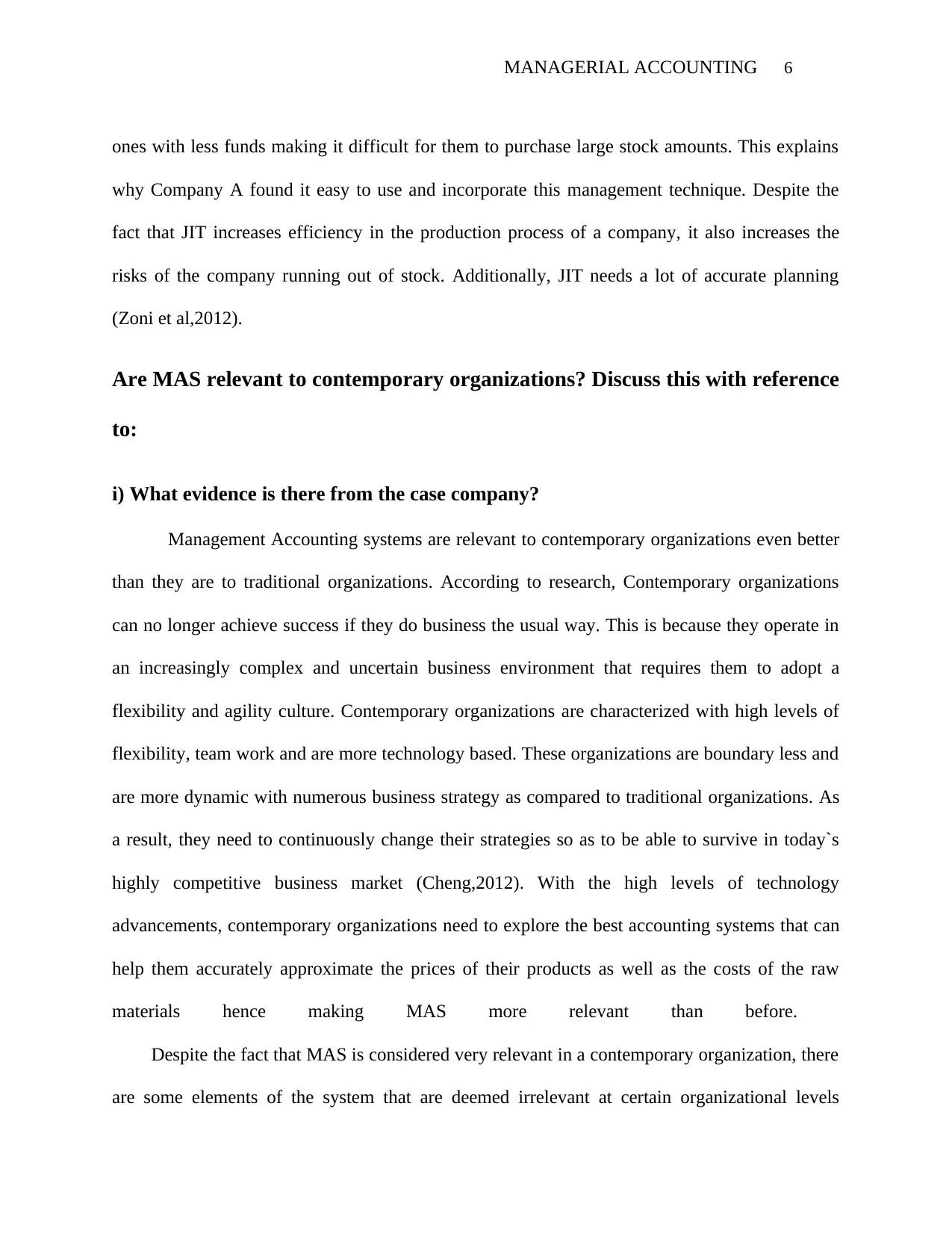
MANAGERIAL ACCOUNTING 6
ones with less funds making it difficult for them to purchase large stock amounts. This explains
why Company A found it easy to use and incorporate this management technique. Despite the
fact that JIT increases efficiency in the production process of a company, it also increases the
risks of the company running out of stock. Additionally, JIT needs a lot of accurate planning
(Zoni et al,2012).
Are MAS relevant to contemporary organizations? Discuss this with reference
to:
i) What evidence is there from the case company?
Management Accounting systems are relevant to contemporary organizations even better
than they are to traditional organizations. According to research, Contemporary organizations
can no longer achieve success if they do business the usual way. This is because they operate in
an increasingly complex and uncertain business environment that requires them to adopt a
flexibility and agility culture. Contemporary organizations are characterized with high levels of
flexibility, team work and are more technology based. These organizations are boundary less and
are more dynamic with numerous business strategy as compared to traditional organizations. As
a result, they need to continuously change their strategies so as to be able to survive in today`s
highly competitive business market (Cheng,2012). With the high levels of technology
advancements, contemporary organizations need to explore the best accounting systems that can
help them accurately approximate the prices of their products as well as the costs of the raw
materials hence making MAS more relevant than before.
Despite the fact that MAS is considered very relevant in a contemporary organization, there
are some elements of the system that are deemed irrelevant at certain organizational levels
ones with less funds making it difficult for them to purchase large stock amounts. This explains
why Company A found it easy to use and incorporate this management technique. Despite the
fact that JIT increases efficiency in the production process of a company, it also increases the
risks of the company running out of stock. Additionally, JIT needs a lot of accurate planning
(Zoni et al,2012).
Are MAS relevant to contemporary organizations? Discuss this with reference
to:
i) What evidence is there from the case company?
Management Accounting systems are relevant to contemporary organizations even better
than they are to traditional organizations. According to research, Contemporary organizations
can no longer achieve success if they do business the usual way. This is because they operate in
an increasingly complex and uncertain business environment that requires them to adopt a
flexibility and agility culture. Contemporary organizations are characterized with high levels of
flexibility, team work and are more technology based. These organizations are boundary less and
are more dynamic with numerous business strategy as compared to traditional organizations. As
a result, they need to continuously change their strategies so as to be able to survive in today`s
highly competitive business market (Cheng,2012). With the high levels of technology
advancements, contemporary organizations need to explore the best accounting systems that can
help them accurately approximate the prices of their products as well as the costs of the raw
materials hence making MAS more relevant than before.
Despite the fact that MAS is considered very relevant in a contemporary organization, there
are some elements of the system that are deemed irrelevant at certain organizational levels
⊘ This is a preview!⊘
Do you want full access?
Subscribe today to unlock all pages.

Trusted by 1+ million students worldwide
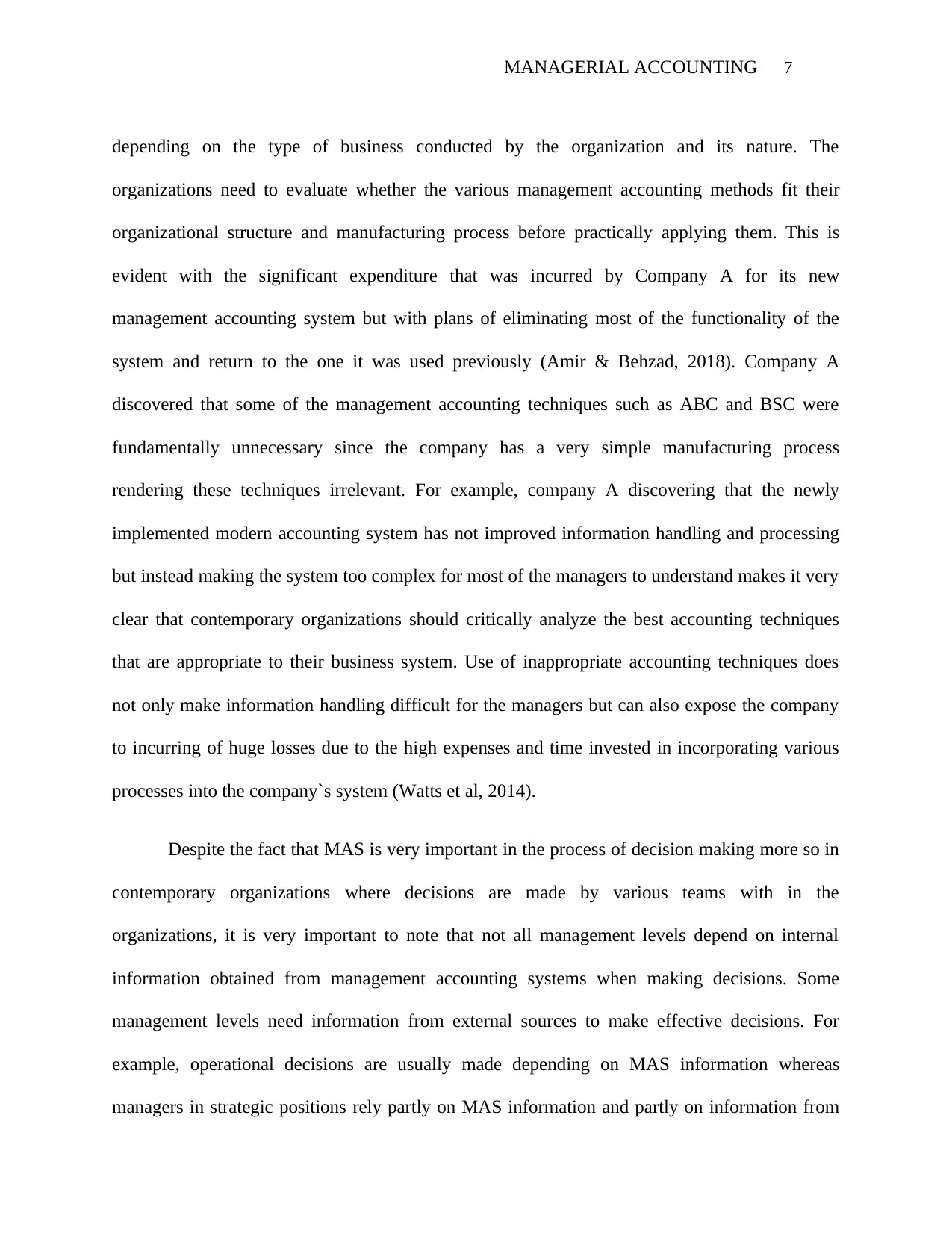
MANAGERIAL ACCOUNTING 7
depending on the type of business conducted by the organization and its nature. The
organizations need to evaluate whether the various management accounting methods fit their
organizational structure and manufacturing process before practically applying them. This is
evident with the significant expenditure that was incurred by Company A for its new
management accounting system but with plans of eliminating most of the functionality of the
system and return to the one it was used previously (Amir & Behzad, 2018). Company A
discovered that some of the management accounting techniques such as ABC and BSC were
fundamentally unnecessary since the company has a very simple manufacturing process
rendering these techniques irrelevant. For example, company A discovering that the newly
implemented modern accounting system has not improved information handling and processing
but instead making the system too complex for most of the managers to understand makes it very
clear that contemporary organizations should critically analyze the best accounting techniques
that are appropriate to their business system. Use of inappropriate accounting techniques does
not only make information handling difficult for the managers but can also expose the company
to incurring of huge losses due to the high expenses and time invested in incorporating various
processes into the company`s system (Watts et al, 2014).
Despite the fact that MAS is very important in the process of decision making more so in
contemporary organizations where decisions are made by various teams with in the
organizations, it is very important to note that not all management levels depend on internal
information obtained from management accounting systems when making decisions. Some
management levels need information from external sources to make effective decisions. For
example, operational decisions are usually made depending on MAS information whereas
managers in strategic positions rely partly on MAS information and partly on information from
depending on the type of business conducted by the organization and its nature. The
organizations need to evaluate whether the various management accounting methods fit their
organizational structure and manufacturing process before practically applying them. This is
evident with the significant expenditure that was incurred by Company A for its new
management accounting system but with plans of eliminating most of the functionality of the
system and return to the one it was used previously (Amir & Behzad, 2018). Company A
discovered that some of the management accounting techniques such as ABC and BSC were
fundamentally unnecessary since the company has a very simple manufacturing process
rendering these techniques irrelevant. For example, company A discovering that the newly
implemented modern accounting system has not improved information handling and processing
but instead making the system too complex for most of the managers to understand makes it very
clear that contemporary organizations should critically analyze the best accounting techniques
that are appropriate to their business system. Use of inappropriate accounting techniques does
not only make information handling difficult for the managers but can also expose the company
to incurring of huge losses due to the high expenses and time invested in incorporating various
processes into the company`s system (Watts et al, 2014).
Despite the fact that MAS is very important in the process of decision making more so in
contemporary organizations where decisions are made by various teams with in the
organizations, it is very important to note that not all management levels depend on internal
information obtained from management accounting systems when making decisions. Some
management levels need information from external sources to make effective decisions. For
example, operational decisions are usually made depending on MAS information whereas
managers in strategic positions rely partly on MAS information and partly on information from
Paraphrase This Document
Need a fresh take? Get an instant paraphrase of this document with our AI Paraphraser
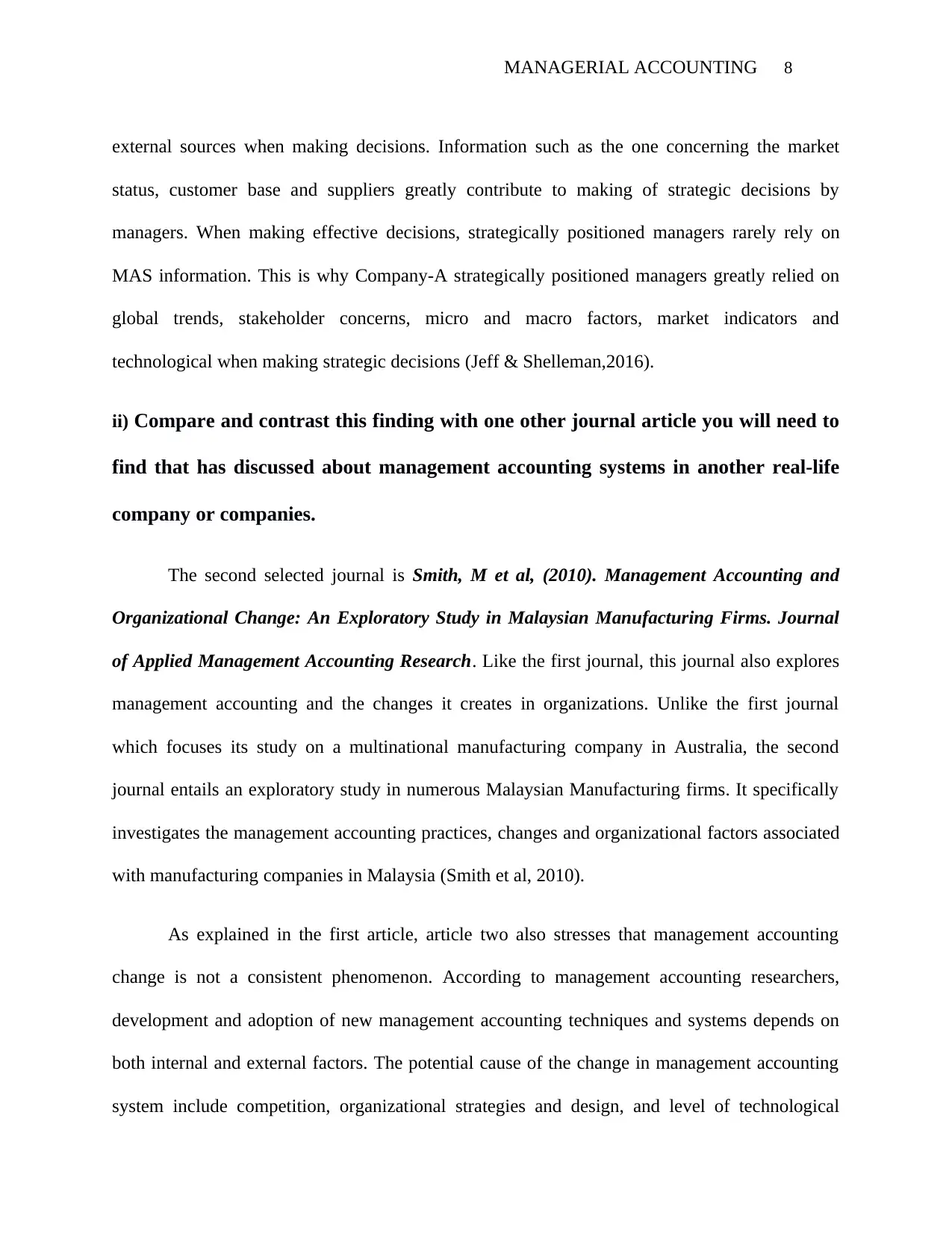
MANAGERIAL ACCOUNTING 8
external sources when making decisions. Information such as the one concerning the market
status, customer base and suppliers greatly contribute to making of strategic decisions by
managers. When making effective decisions, strategically positioned managers rarely rely on
MAS information. This is why Company-A strategically positioned managers greatly relied on
global trends, stakeholder concerns, micro and macro factors, market indicators and
technological when making strategic decisions (Jeff & Shelleman,2016).
ii) Compare and contrast this finding with one other journal article you will need to
find that has discussed about management accounting systems in another real-life
company or companies.
The second selected journal is Smith, M et al, (2010). Management Accounting and
Organizational Change: An Exploratory Study in Malaysian Manufacturing Firms. Journal
of Applied Management Accounting Research. Like the first journal, this journal also explores
management accounting and the changes it creates in organizations. Unlike the first journal
which focuses its study on a multinational manufacturing company in Australia, the second
journal entails an exploratory study in numerous Malaysian Manufacturing firms. It specifically
investigates the management accounting practices, changes and organizational factors associated
with manufacturing companies in Malaysia (Smith et al, 2010).
As explained in the first article, article two also stresses that management accounting
change is not a consistent phenomenon. According to management accounting researchers,
development and adoption of new management accounting techniques and systems depends on
both internal and external factors. The potential cause of the change in management accounting
system include competition, organizational strategies and design, and level of technological
external sources when making decisions. Information such as the one concerning the market
status, customer base and suppliers greatly contribute to making of strategic decisions by
managers. When making effective decisions, strategically positioned managers rarely rely on
MAS information. This is why Company-A strategically positioned managers greatly relied on
global trends, stakeholder concerns, micro and macro factors, market indicators and
technological when making strategic decisions (Jeff & Shelleman,2016).
ii) Compare and contrast this finding with one other journal article you will need to
find that has discussed about management accounting systems in another real-life
company or companies.
The second selected journal is Smith, M et al, (2010). Management Accounting and
Organizational Change: An Exploratory Study in Malaysian Manufacturing Firms. Journal
of Applied Management Accounting Research. Like the first journal, this journal also explores
management accounting and the changes it creates in organizations. Unlike the first journal
which focuses its study on a multinational manufacturing company in Australia, the second
journal entails an exploratory study in numerous Malaysian Manufacturing firms. It specifically
investigates the management accounting practices, changes and organizational factors associated
with manufacturing companies in Malaysia (Smith et al, 2010).
As explained in the first article, article two also stresses that management accounting
change is not a consistent phenomenon. According to management accounting researchers,
development and adoption of new management accounting techniques and systems depends on
both internal and external factors. The potential cause of the change in management accounting
system include competition, organizational strategies and design, and level of technological
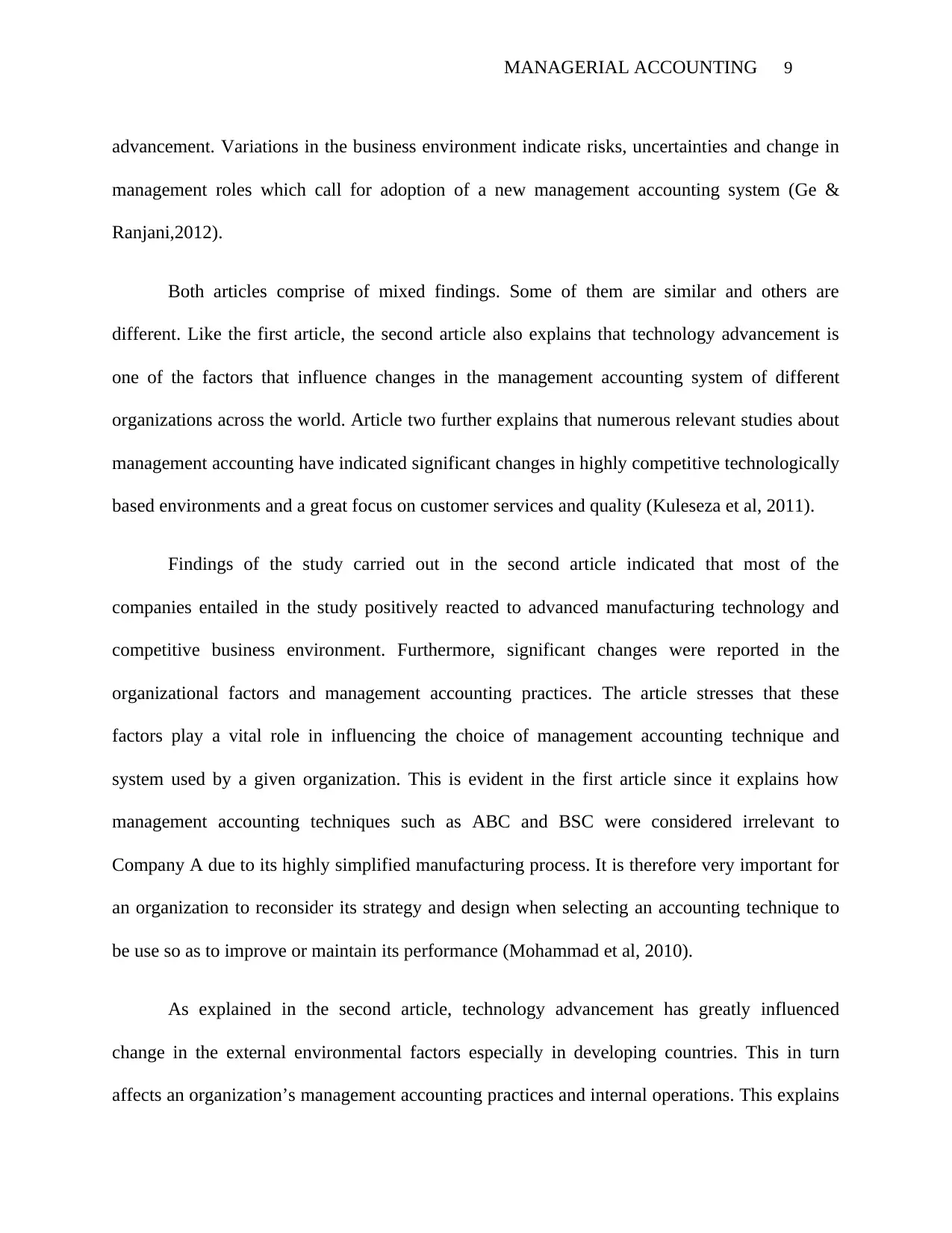
MANAGERIAL ACCOUNTING 9
advancement. Variations in the business environment indicate risks, uncertainties and change in
management roles which call for adoption of a new management accounting system (Ge &
Ranjani,2012).
Both articles comprise of mixed findings. Some of them are similar and others are
different. Like the first article, the second article also explains that technology advancement is
one of the factors that influence changes in the management accounting system of different
organizations across the world. Article two further explains that numerous relevant studies about
management accounting have indicated significant changes in highly competitive technologically
based environments and a great focus on customer services and quality (Kuleseza et al, 2011).
Findings of the study carried out in the second article indicated that most of the
companies entailed in the study positively reacted to advanced manufacturing technology and
competitive business environment. Furthermore, significant changes were reported in the
organizational factors and management accounting practices. The article stresses that these
factors play a vital role in influencing the choice of management accounting technique and
system used by a given organization. This is evident in the first article since it explains how
management accounting techniques such as ABC and BSC were considered irrelevant to
Company A due to its highly simplified manufacturing process. It is therefore very important for
an organization to reconsider its strategy and design when selecting an accounting technique to
be use so as to improve or maintain its performance (Mohammad et al, 2010).
As explained in the second article, technology advancement has greatly influenced
change in the external environmental factors especially in developing countries. This in turn
affects an organization’s management accounting practices and internal operations. This explains
advancement. Variations in the business environment indicate risks, uncertainties and change in
management roles which call for adoption of a new management accounting system (Ge &
Ranjani,2012).
Both articles comprise of mixed findings. Some of them are similar and others are
different. Like the first article, the second article also explains that technology advancement is
one of the factors that influence changes in the management accounting system of different
organizations across the world. Article two further explains that numerous relevant studies about
management accounting have indicated significant changes in highly competitive technologically
based environments and a great focus on customer services and quality (Kuleseza et al, 2011).
Findings of the study carried out in the second article indicated that most of the
companies entailed in the study positively reacted to advanced manufacturing technology and
competitive business environment. Furthermore, significant changes were reported in the
organizational factors and management accounting practices. The article stresses that these
factors play a vital role in influencing the choice of management accounting technique and
system used by a given organization. This is evident in the first article since it explains how
management accounting techniques such as ABC and BSC were considered irrelevant to
Company A due to its highly simplified manufacturing process. It is therefore very important for
an organization to reconsider its strategy and design when selecting an accounting technique to
be use so as to improve or maintain its performance (Mohammad et al, 2010).
As explained in the second article, technology advancement has greatly influenced
change in the external environmental factors especially in developing countries. This in turn
affects an organization’s management accounting practices and internal operations. This explains
⊘ This is a preview!⊘
Do you want full access?
Subscribe today to unlock all pages.

Trusted by 1+ million students worldwide
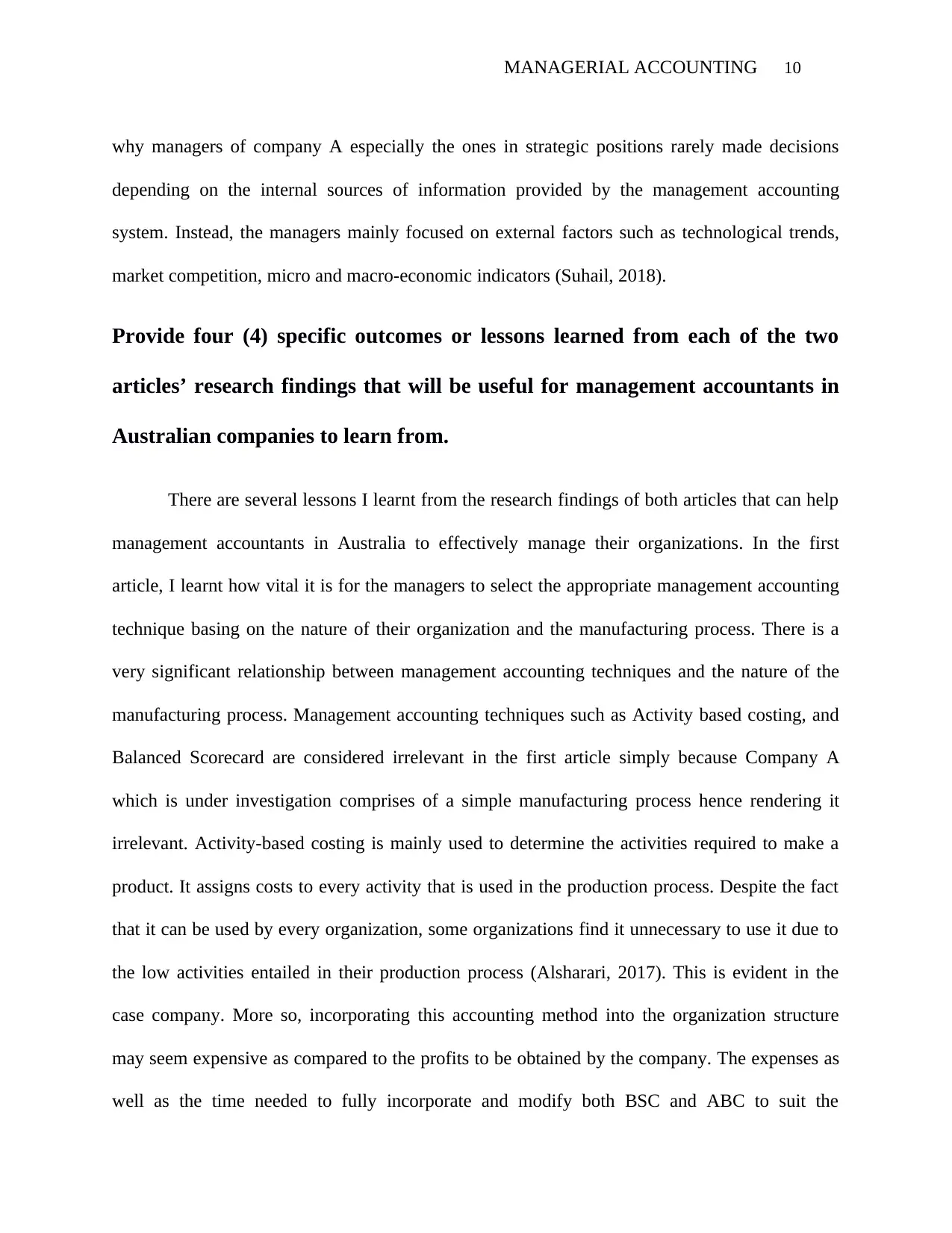
MANAGERIAL ACCOUNTING 10
why managers of company A especially the ones in strategic positions rarely made decisions
depending on the internal sources of information provided by the management accounting
system. Instead, the managers mainly focused on external factors such as technological trends,
market competition, micro and macro-economic indicators (Suhail, 2018).
Provide four (4) specific outcomes or lessons learned from each of the two
articles’ research findings that will be useful for management accountants in
Australian companies to learn from.
There are several lessons I learnt from the research findings of both articles that can help
management accountants in Australia to effectively manage their organizations. In the first
article, I learnt how vital it is for the managers to select the appropriate management accounting
technique basing on the nature of their organization and the manufacturing process. There is a
very significant relationship between management accounting techniques and the nature of the
manufacturing process. Management accounting techniques such as Activity based costing, and
Balanced Scorecard are considered irrelevant in the first article simply because Company A
which is under investigation comprises of a simple manufacturing process hence rendering it
irrelevant. Activity-based costing is mainly used to determine the activities required to make a
product. It assigns costs to every activity that is used in the production process. Despite the fact
that it can be used by every organization, some organizations find it unnecessary to use it due to
the low activities entailed in their production process (Alsharari, 2017). This is evident in the
case company. More so, incorporating this accounting method into the organization structure
may seem expensive as compared to the profits to be obtained by the company. The expenses as
well as the time needed to fully incorporate and modify both BSC and ABC to suit the
why managers of company A especially the ones in strategic positions rarely made decisions
depending on the internal sources of information provided by the management accounting
system. Instead, the managers mainly focused on external factors such as technological trends,
market competition, micro and macro-economic indicators (Suhail, 2018).
Provide four (4) specific outcomes or lessons learned from each of the two
articles’ research findings that will be useful for management accountants in
Australian companies to learn from.
There are several lessons I learnt from the research findings of both articles that can help
management accountants in Australia to effectively manage their organizations. In the first
article, I learnt how vital it is for the managers to select the appropriate management accounting
technique basing on the nature of their organization and the manufacturing process. There is a
very significant relationship between management accounting techniques and the nature of the
manufacturing process. Management accounting techniques such as Activity based costing, and
Balanced Scorecard are considered irrelevant in the first article simply because Company A
which is under investigation comprises of a simple manufacturing process hence rendering it
irrelevant. Activity-based costing is mainly used to determine the activities required to make a
product. It assigns costs to every activity that is used in the production process. Despite the fact
that it can be used by every organization, some organizations find it unnecessary to use it due to
the low activities entailed in their production process (Alsharari, 2017). This is evident in the
case company. More so, incorporating this accounting method into the organization structure
may seem expensive as compared to the profits to be obtained by the company. The expenses as
well as the time needed to fully incorporate and modify both BSC and ABC to suit the
Paraphrase This Document
Need a fresh take? Get an instant paraphrase of this document with our AI Paraphraser
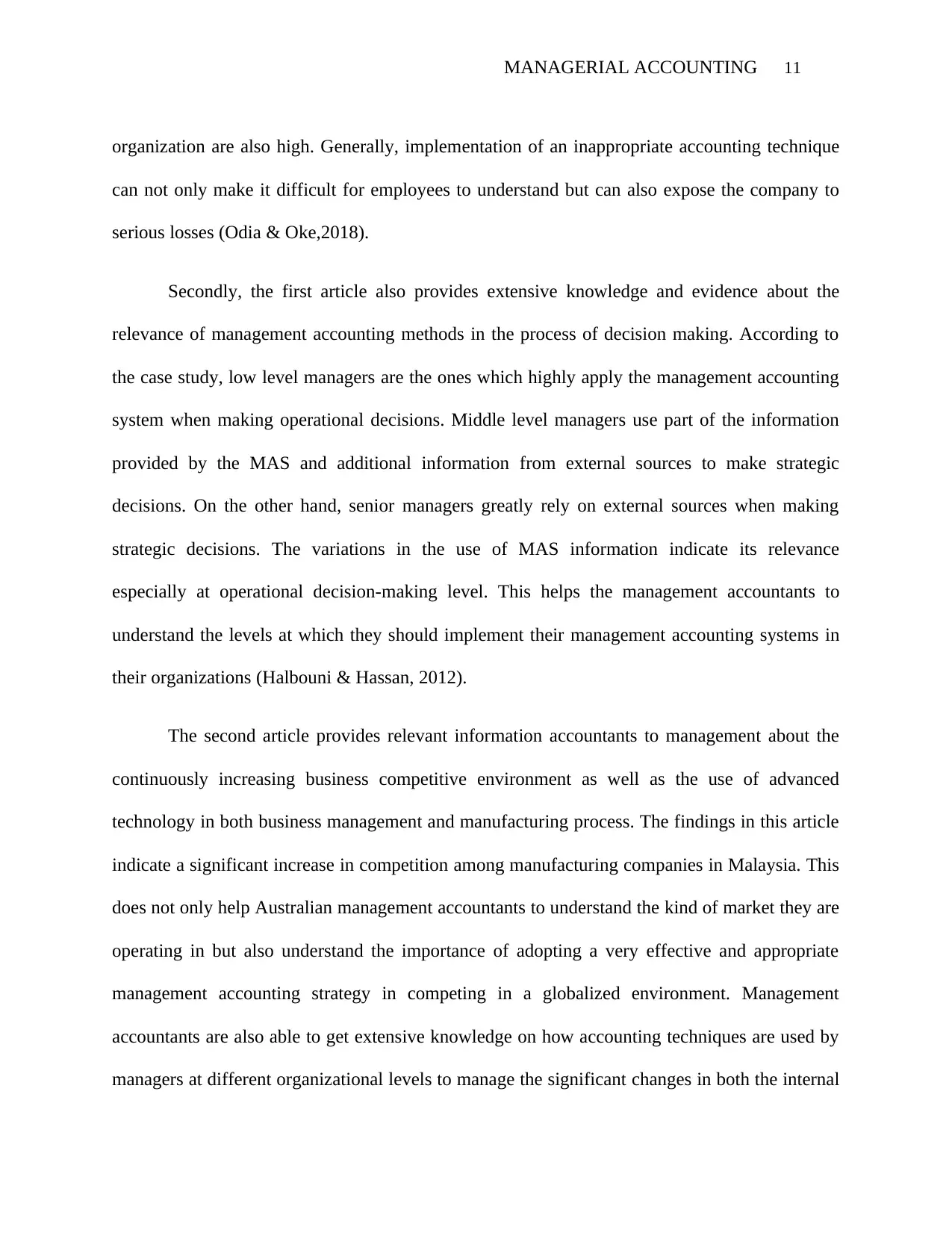
MANAGERIAL ACCOUNTING 11
organization are also high. Generally, implementation of an inappropriate accounting technique
can not only make it difficult for employees to understand but can also expose the company to
serious losses (Odia & Oke,2018).
Secondly, the first article also provides extensive knowledge and evidence about the
relevance of management accounting methods in the process of decision making. According to
the case study, low level managers are the ones which highly apply the management accounting
system when making operational decisions. Middle level managers use part of the information
provided by the MAS and additional information from external sources to make strategic
decisions. On the other hand, senior managers greatly rely on external sources when making
strategic decisions. The variations in the use of MAS information indicate its relevance
especially at operational decision-making level. This helps the management accountants to
understand the levels at which they should implement their management accounting systems in
their organizations (Halbouni & Hassan, 2012).
The second article provides relevant information accountants to management about the
continuously increasing business competitive environment as well as the use of advanced
technology in both business management and manufacturing process. The findings in this article
indicate a significant increase in competition among manufacturing companies in Malaysia. This
does not only help Australian management accountants to understand the kind of market they are
operating in but also understand the importance of adopting a very effective and appropriate
management accounting strategy in competing in a globalized environment. Management
accountants are also able to get extensive knowledge on how accounting techniques are used by
managers at different organizational levels to manage the significant changes in both the internal
organization are also high. Generally, implementation of an inappropriate accounting technique
can not only make it difficult for employees to understand but can also expose the company to
serious losses (Odia & Oke,2018).
Secondly, the first article also provides extensive knowledge and evidence about the
relevance of management accounting methods in the process of decision making. According to
the case study, low level managers are the ones which highly apply the management accounting
system when making operational decisions. Middle level managers use part of the information
provided by the MAS and additional information from external sources to make strategic
decisions. On the other hand, senior managers greatly rely on external sources when making
strategic decisions. The variations in the use of MAS information indicate its relevance
especially at operational decision-making level. This helps the management accountants to
understand the levels at which they should implement their management accounting systems in
their organizations (Halbouni & Hassan, 2012).
The second article provides relevant information accountants to management about the
continuously increasing business competitive environment as well as the use of advanced
technology in both business management and manufacturing process. The findings in this article
indicate a significant increase in competition among manufacturing companies in Malaysia. This
does not only help Australian management accountants to understand the kind of market they are
operating in but also understand the importance of adopting a very effective and appropriate
management accounting strategy in competing in a globalized environment. Management
accountants are also able to get extensive knowledge on how accounting techniques are used by
managers at different organizational levels to manage the significant changes in both the internal
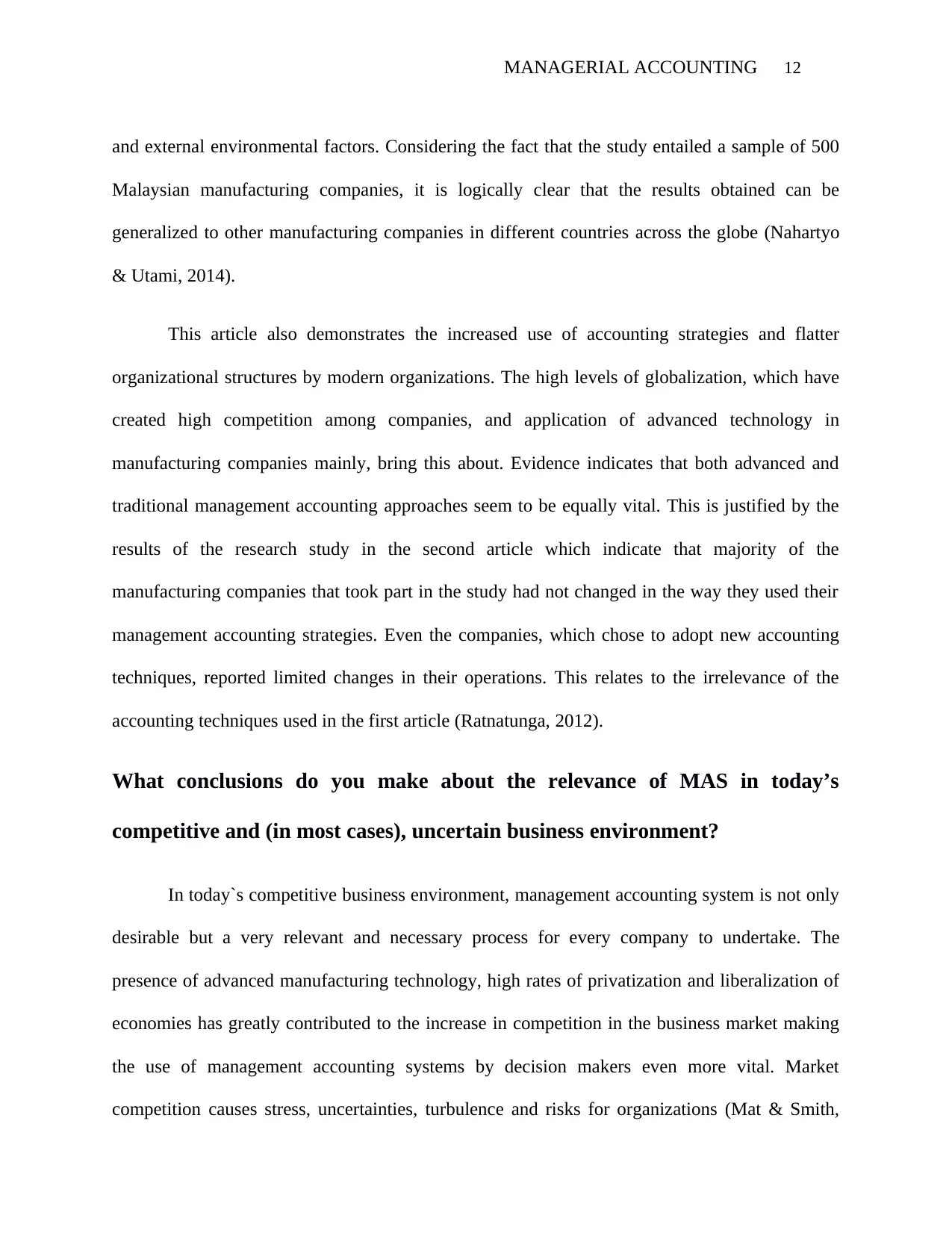
MANAGERIAL ACCOUNTING 12
and external environmental factors. Considering the fact that the study entailed a sample of 500
Malaysian manufacturing companies, it is logically clear that the results obtained can be
generalized to other manufacturing companies in different countries across the globe (Nahartyo
& Utami, 2014).
This article also demonstrates the increased use of accounting strategies and flatter
organizational structures by modern organizations. The high levels of globalization, which have
created high competition among companies, and application of advanced technology in
manufacturing companies mainly, bring this about. Evidence indicates that both advanced and
traditional management accounting approaches seem to be equally vital. This is justified by the
results of the research study in the second article which indicate that majority of the
manufacturing companies that took part in the study had not changed in the way they used their
management accounting strategies. Even the companies, which chose to adopt new accounting
techniques, reported limited changes in their operations. This relates to the irrelevance of the
accounting techniques used in the first article (Ratnatunga, 2012).
What conclusions do you make about the relevance of MAS in today’s
competitive and (in most cases), uncertain business environment?
In today`s competitive business environment, management accounting system is not only
desirable but a very relevant and necessary process for every company to undertake. The
presence of advanced manufacturing technology, high rates of privatization and liberalization of
economies has greatly contributed to the increase in competition in the business market making
the use of management accounting systems by decision makers even more vital. Market
competition causes stress, uncertainties, turbulence and risks for organizations (Mat & Smith,
and external environmental factors. Considering the fact that the study entailed a sample of 500
Malaysian manufacturing companies, it is logically clear that the results obtained can be
generalized to other manufacturing companies in different countries across the globe (Nahartyo
& Utami, 2014).
This article also demonstrates the increased use of accounting strategies and flatter
organizational structures by modern organizations. The high levels of globalization, which have
created high competition among companies, and application of advanced technology in
manufacturing companies mainly, bring this about. Evidence indicates that both advanced and
traditional management accounting approaches seem to be equally vital. This is justified by the
results of the research study in the second article which indicate that majority of the
manufacturing companies that took part in the study had not changed in the way they used their
management accounting strategies. Even the companies, which chose to adopt new accounting
techniques, reported limited changes in their operations. This relates to the irrelevance of the
accounting techniques used in the first article (Ratnatunga, 2012).
What conclusions do you make about the relevance of MAS in today’s
competitive and (in most cases), uncertain business environment?
In today`s competitive business environment, management accounting system is not only
desirable but a very relevant and necessary process for every company to undertake. The
presence of advanced manufacturing technology, high rates of privatization and liberalization of
economies has greatly contributed to the increase in competition in the business market making
the use of management accounting systems by decision makers even more vital. Market
competition causes stress, uncertainties, turbulence and risks for organizations (Mat & Smith,
⊘ This is a preview!⊘
Do you want full access?
Subscribe today to unlock all pages.

Trusted by 1+ million students worldwide
1 out of 19
Related Documents
Your All-in-One AI-Powered Toolkit for Academic Success.
+13062052269
info@desklib.com
Available 24*7 on WhatsApp / Email
![[object Object]](/_next/static/media/star-bottom.7253800d.svg)
Unlock your academic potential
Copyright © 2020–2026 A2Z Services. All Rights Reserved. Developed and managed by ZUCOL.





